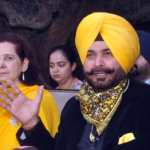Quincy Jones, the multi-talented music titan whose huge legacy ranged from producing Michael Jackson’s historic “Thriller” album to writing prize-winning movie and tv scores and collaborating with Frank Sinatra, Ray Charles and a whole lot of different recording artists, has died at 91.
Jones’ publicist, Arnold Robinson, says he died Sunday night time at his residence within the Bel Air part of Los Angeles, surrounded by his household.
Chris Pizzello / Invision / AP, File)
“Tonight, with full however damaged hearts, we should share the information of our father and brother Quincy Jones’ passing,” the household mentioned in an announcement. “And though that is an unbelievable loss for our household, we have a good time the good life that he lived and know there’ll by no means be one other like him.
“He’s really one among a form and we’ll miss him dearly; we take consolation and immense pleasure in understanding that the love and pleasure, that had been the essence of his being, was shared with the world by all that he created. By his music and his boundless love, Quincy Jones’ coronary heart will beat for eternity.”
Jones rose from operating with gangs on the South Facet of Chicago to the very heights of present enterprise, turning into one of many first Black executives to thrive in Hollywood and amassing a rare music catalog that features a few of the richest moments of American rhythm and tune.
For years, it was unlikely to discover a music lover who did not personal at the least one report along with his title on it or a frontrunner within the leisure trade and past who did not have some connection to him.
Jones stored firm with presidents and international leaders, film stars and musicians, philanthropists and enterprise leaders. He toured with Rely Basie and Lionel Hampton, organized information for Sinatra and Ella Fitzgerald, composed the soundtracks for “Roots” and “Within the Warmth of the Evening,” organized President Invoice Clinton’s first inaugural celebration and oversaw the all-star recording of “We Are the World,” the 1985 charity report for famine aid in Africa.
Lionel Richie, who co-wrote “We Are the World” and was amongst its featured singers, would name Jones “the grasp orchestrator.”
Jones’ work with Michael Jackson
In a profession that started when information had been nonetheless performed on vinyl at 78 RPM, the highest honors he obtained are seemingly those for his productions with Jackson: “Off the Wall,” “Thriller” and “Unhealthy” had been albums near-universal of their type and enchantment. Jones’ versatility and creativeness helped set off Jackson’s explosive expertise as he remodeled from youngster star to the “King of Pop.” On such basic tracks as “Billie Jean” and “Do not Cease ‘Til You Get Sufficient,” Jones and Jackson usual a worldwide soundscape out of disco, funk, rock, pop, R&B and jazz and African chants. For “Thriller,” a few of the most memorable touches originated with Jones, who recruited Eddie Van Halen for a guitar solo on the genre-fusing “Beat It” and introduced in Vincent Value for a ghoulish voiceover on the title monitor.
“Thriller” bought greater than 20 million copies in 1983 alone and has contended with the Eagles’ “Best Hits 1971-1975” amongst others because the best-selling album of all time.
“If an album does not do effectively, everybody says ‘it was the producers fault’; so if it does effectively, it needs to be your ‘fault,’ too,” Jones mentioned in an interview with the Library of Congress in 2016. “The tracks do not simply abruptly seem. The producer has to have the ability, expertise and talent to information the imaginative and prescient to completion.”
The record of his honors and awards fills 18 pages in his 2001 autobiography “Q”, together with 27 Grammys on the time (now 28), an honorary Academy Award (now two) and an Emmy for “Roots.” He additionally obtained France’s Legion d’Honneur, the Rudolph Valentino Award from the Republic of Italy and a Kennedy Middle tribute for his contributions to American tradition. He was the topic of a 1990 documentary, “Pay attention Up: The Lives of Quincy Jones” and a 2018 movie by daughter Rashida Jones. His memoir made him a best-selling creator.
Music as Jones’ savior
Born in Chicago in 1933, Jones would cite the hymns his mom sang round the home as the primary music he may bear in mind. However he regarded again sadly on his childhood, as soon as telling Oprah Winfrey that “There are two varieties of individuals: those that have nurturing mother and father or caretakers, and people who do not. Nothing’s in between.” Jones’ mom suffered from emotional issues and was finally institutionalized, a loss that made the world appear “mindless” for Quincy. He spent a lot of his time in Chicago on the streets, with gangs, stealing and preventing.
“They nailed my hand to a fence with a switchblade, man,” he advised the AP in 2018, exhibiting a scar from his childhood.
Music saved him. As a boy, he discovered {that a} Chicago neighbor owned a piano and he quickly performed it continually himself. His father moved to Washington state when Quincy was 10 and his world modified at a neighborhood recreation heart. Jones and a few pals had damaged into the kitchen and helped themselves to lemon meringue pie when Jones observed a small room close by with a stage. On the stage was a piano.
“I went up there, paused, stared, after which tinkled on it for a second,” he wrote in his autobiography. “That is the place I started to search out peace. I used to be 11. I knew this was it for me. Ceaselessly.”
Inside a number of years, he was taking part in trumpet and befriending a younger blind musician named Ray Charles, who grew to become a lifelong buddy. He was gifted sufficient to win a scholarship on the Berklee Faculty of Music in Boston, however dropped out when Hampton invited him to tour along with his band. Jones went on to work as a contract composer, conductor, arranger and producer. As a teen, he backed Billie Vacation. By his mid-20s, he was touring along with his personal band.
“We had the perfect jazz band on the planet, and but we had been actually ravenous,” Jones later advised Musician journal. “That is after I found that there was music, and there was the music enterprise. If I had been to outlive, I must study the distinction between the 2.”
Jones, the businessman
As a music govt, he overcame racial limitations by turning into a vice chairman at Mercury Information within the early ’60s. In 1971, he grew to become the primary Black musical director for the Academy Awards ceremony. The primary film he produced, “The Colour Purple,” obtained 11 Oscar nominations in 1986 however, to his nice disappointment, no wins.
In a partnership with Time Warner, he created Quincy Jones Leisure, which included the pop-culture journal Vibe and Qwest Broadcasting. The corporate was bought for $270 million in 1999.
“My philosophy as a businessman has all the time come from the identical roots as my private credo: Take gifted folks on their very own phrases and deal with them pretty and with respect, regardless of who they’re or the place they arrive from,” Jones wrote in his autobiography.
Jones, the epitome of versatility
He was comfy with just about each type of American music, whether or not setting Sinatra’s “Fly Me to the Moon” to a punchy, swinging rhythm and wistful flute or opening his manufacturing of Charles’ soulful “Within the Warmth of the Evening” with a lusty tenor sax solo. He labored with jazz giants (Dizzy Gillespie, Rely Basie, Duke Ellington), rappers (Snoop Dogg, LL Cool J), crooners (Sinatra, Tony Bennett), pop singers (Lesley Gore) and rhythm and blues stars (Chaka Khan, rapper and singer Queen Latifah).
On “We’re the World” alone, performers included Michael Jackson, Bob Dylan, Billy Joel, Stevie Surprise and Bruce Springsteen. He co-wrote hits for Jackson – “P.Y.T (Fairly Younger Factor)” – and Donna Summer time – “Love Is in Management (Finger on the Set off) – and had songs sampled by Tupac Shakur, Kanye West and different rappers. He even composed the theme tune for the sitcom “Sanford and Son.”








